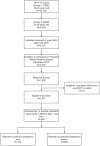History of pregnancy loss increases the risk of mental health problems in subsequent pregnancies but not in the postpartum
- PMID: 24733508
- PMCID: PMC3986356
- DOI: 10.1371/journal.pone.0095038
History of pregnancy loss increases the risk of mental health problems in subsequent pregnancies but not in the postpartum
Abstract
While grief, emotional distress and other mental health conditions have been associated with pregnancy loss, less is known about the mental health impact of these events during subsequent pregnancies and births. This paper examined the impact of any type of pregnancy loss on mental health in a subsequent pregnancy and postpartum. Data were obtained from a sub-sample (N = 584) of the 1973-78 cohort of the Australian Longitudinal Study on Women's Health, a prospective cohort study that has been collecting data since 1996. Pregnancy loss was defined as miscarriage, termination due to medical reasons, ectopic pregnancy and stillbirth. Mental health outcomes included depression, anxiety, stress or distress, sadness or low mood, excessive worry, lack of enjoyment, and feelings of guilt. Demographic factors and mental health history were controlled for in the analysis. Women with a previous pregnancy loss were more likely to experience sadness or low mood (AOR = 1.75, 95% CI: 1.11 to 2.76, p = 0.0162), and excessive worry (AOR = 2.01, 95% CI: 1.24 to 3.24, p = 0.0043) during a subsequent pregnancy, but not during the postpartum phase following a subsequent birth. These results indicate that while women who have experienced a pregnancy loss are a more vulnerable population during a subsequent pregnancy, these deficits are not evident in the postpartum.
Conflict of interest statement
Figures
Similar articles
-
Women's mental health in the perinatal period according to migrant status: the French representative ELFE birth cohort.Eur J Public Health. 2018 Jun 1;28(3):458-463. doi: 10.1093/eurpub/cky008. Eur J Public Health. 2018. PMID: 29790990
-
Depression and termination of pregnancy (induced abortion) in a national cohort of young Australian women: the confounding effect of women's experience of violence.BMC Public Health. 2008 Feb 26;8:75. doi: 10.1186/1471-2458-8-75. BMC Public Health. 2008. PMID: 18302736 Free PMC article.
-
Pregnancy losses in young Australian women: findings from the Australian Longitudinal Study on Women's Health.Womens Health Issues. 2009 Jan-Feb;19(1):21-9. doi: 10.1016/j.whi.2008.08.007. Womens Health Issues. 2009. PMID: 19111784
-
Maternal mental health in Australia and New Zealand: a review of longitudinal studies.Women Birth. 2013 Sep;26(3):167-78. doi: 10.1016/j.wombi.2013.02.006. Epub 2013 Apr 12. Women Birth. 2013. PMID: 23583667 Review.
-
Pregnancy loss.Best Pract Res Clin Obstet Gynaecol. 2014 Jan;28(1):169-78. doi: 10.1016/j.bpobgyn.2013.08.012. Epub 2013 Sep 3. Best Pract Res Clin Obstet Gynaecol. 2014. PMID: 24047642 Review.
Cited by
-
Ectopic pregnancy secondary to in vitro fertilisation-embryo transfer: pathogenic mechanisms and management strategies.Reprod Biol Endocrinol. 2015 Apr 12;13:30. doi: 10.1186/s12958-015-0025-0. Reprod Biol Endocrinol. 2015. PMID: 25884617 Free PMC article. Review.
-
The abortion and mental health controversy: A comprehensive literature review of common ground agreements, disagreements, actionable recommendations, and research opportunities.SAGE Open Med. 2018 Oct 29;6:2050312118807624. doi: 10.1177/2050312118807624. eCollection 2018. SAGE Open Med. 2018. PMID: 30397472 Free PMC article. Review.
-
Postpartum Diet Quality: A Cross-Sectional Analysis from the Australian Longitudinal Study on Women's Health.J Clin Med. 2020 Feb 6;9(2):446. doi: 10.3390/jcm9020446. J Clin Med. 2020. PMID: 32041231 Free PMC article.
-
Infertility and Perinatal Loss: When the Bough Breaks.Curr Psychiatry Rep. 2016 Mar;18(3):31. doi: 10.1007/s11920-016-0663-8. Curr Psychiatry Rep. 2016. PMID: 26847216 Free PMC article. Review.
-
Global variation in the assessment of psychological trauma in pregnancy.Glob Ment Health (Camb). 2025 Jan 7;12:e10. doi: 10.1017/gmh.2024.152. eCollection 2025. Glob Ment Health (Camb). 2025. PMID: 39935728 Free PMC article. Review.
References
-
- Lok IH, Yip AS, Lee DT, Sahota D, Chung TK (2010) A 1-year longitudinal study of psychological morbidity after miscarriage. Fertil Steril 93: 1966–1975. - PubMed
-
- Bradshaw Z, Slade P (2003) The effects of induced abortion on emotional experiences and relationships: a critical review of the literature. Clin Psychol Rev 23: 929–958. - PubMed
-
- Brier N (2004) Anxiety after miscarriage: a review of the empirical literature and implications for clinical practice. Birth 31: 138–142. - PubMed
-
- Fertl KI, Bergner A, Beyer R, Klapp BF, Rauchfuss M (2009) Levels and effects of different forms of anxiety during pregnancy after a prior miscarriage. European Journal of Obstetrics & Gynecology and Reproductive Biology 142: 23–29. - PubMed
MeSH terms
LinkOut - more resources
Full Text Sources
Other Literature Sources
Medical


